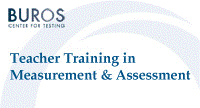Buros-Nebraska Series on Measurement and Testing

Teacher Training in Measurement and Assessment Skills
Date of this Version
1993
Document Type
Article
Citation
Published in Teacher Training in Measurement and Assessment Skills, edited by Steven L. Wise (Lincoln, NE: Buros Institute of Mental Measurements, University of Nebraska–Lincoln, 1993).
Abstract
The current state of teacher training in assessment has been thoroughly documented in previous chapters. The resulting picture is one of neglected and irrelevant training in an arena of professional activity that forms the basis of sound instruction. The decisions teachers must make cannot be made well without sound achievement data. The decisions students make about themselves cannot be made well if those students do not receive sound information on their achievement. The decisions made by those in leadership positions cannot be made well without the sound achievement information that comes from sound assessment. Obviously, high-quality assessment is crucial to the development and presentation of sound educational programs. And yet, we see before us a picture of professional development for educators that is almost completely devoid of assessment training.
Our recently completed, decade-long task analysis of classroom assessment has revealed that teachers typically spend a third of their professional time or more involved in assessment-related activities. They use assessments almost continuously to inform a wide variety of decisions and to serve other purposes that directly influence the quality of the learning experiences provided to students (Stiggins & Conklin, 1992). If school improvement efforts are to succeed, they must include a component that teaches teachers how to use this massive amount of in-class assessment time productively.
In this chapter, I plan to add a few brief insights from the Pacific Northwest to the emerging portrait of teacher training in assessment. Our picture is not different from those already described. It is a picture of neglect. Very few teachers in our region are offered the opportunity to participate in relevant classroom assessment training.
Next, I will discuss some of the possible reasons for this unfortunate neglect. Why has so critical an area of professional competence been given so little attention in teacher preparation for so long?
The third issue I will address is that of the mismatch between (a) what teachers need to know about assessment in order effectively to manage classroom assessment environments and (b) what they are taught about assessment during their professional preparation, if they are offered any training at all. Our analysis of the task demands of classroom assessment has yielded a clear framework of classroom assessment competencies for teachers. I will compare the assessment training currently offered to these essential competencies.


Comments
Copyright © 1993 by Buros Institute of Mental Measurements. Digital edition copyright © 2012 Buros Center for Testing. This book may be downloaded, saved, and printed by an individual for their own use. No part of this book may be re-published, re-posted, or redistributed without written permission of the holder of copyright.